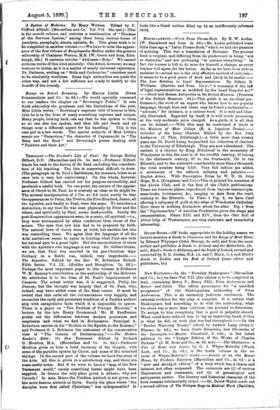THEOLOGY.—The Student's Life of Paul. By George Holley Gilbert, D.D.
(Macmillan and Co. 58. net.)—Professor Gilbert limits his task to the history of St. Paul. excluding the considera- tion of his teaching. The line is somewhat difficult to draw. (The paragraph on St. Paul's Rabbinism, for instance, takes us at once into a very hot controversy.) On the whole, however, Professor. Gilbert has carried out his purpose successfully, and produced a. useful book. On one point, the nature of the appear- ance of Christ to St. Paul, he is scarcely as clear as he might be. The natural interpretation of 1 Cor. xv. 5-8 must surely be that the appearances to Peter, the Twelve, the Five Hundred, James, all the Apostles, and finally to Paul, were the same. To introduce a distinction, to say that He was seen physically by Peter and the others, and spiritually by Paul, seems inadmissible. Surely the post-Res,urrection appearances were, in a sense, all spiritual,—i.e., they were accompanied by other conditions than those of the genies. The eyes that saw him had to be prepared by faith. The natural laws of vision were at work, but another law also was controlling them. We agree that the language of all the Acts narratives seems to agree in limiting what Paul saw with his natural eyes to a great light. But the reconciliation of these with the Apostle's own language is not easy. Dr. Gilbert thinks, we see, that Paul was married in his pre-Christian days Celibacy in a Rabbi was, indeed, very improbable.— The Expositor. Edited by the Rev. W. Robertson Nicholl. Fifth Series. Vol. IX. (Hodder and Stoughton. 7s. 6d.)— Perhaps the most important paper in this volume is Professor W. M. Ramsay's contribution on the authorship of the Hebrews. He attributes it to the time of St. Paul's imprisonment at Cfesarea. The actual writer was, it is suggested, Philip the Deacon; but the thought was largely that of St. Paul, who, indeed, may have added some of the final verses. It must be owned that this suits all the circumstances very happily, and reconciles the early and persistent tradition of a Pauline author- ship with antagonistic facts which it is impossible to ignore. There is a paper on " The Problem of Foreign Missions," a lecture by the late Henry Drummond. Mr. M. Kauffmanu points out the differences between modern pessimism and scepticism and what we find in Ecclesiastes. Principal A. Robertson carries on his " Studies in the Epistle to the Romans," and Professor G. L. Robinson the statement of his conservative view of " The Genesis of Deuteronomy."—The Modern Reader's Bible : the New Testament. Edited by Richard G. -Moulton, M.A. (Macmillan and Co. 2s. 6d.)—Professor Moulton gives us here a brief harmony of the Gospels, with some of the parables spoken by Christ, and some of His detached sayings. In the second part of the volume we have the story of the Acts. All this is given in a satisfactory way, and there are some useful notes. But if we were to have a "map of the New Testament world," surely something better might have been supplied.. In Greece the only place given is Athens; why not Corinth ? In Asia Minor the Pisidian Antioch is not given, nor the more famous Antioch in Syria. Surely the place where " the disciples were first called Christians" was indispensable ? It
looks like a blank outline filled up by an indifferently informed child.


































 Previous page
Previous page